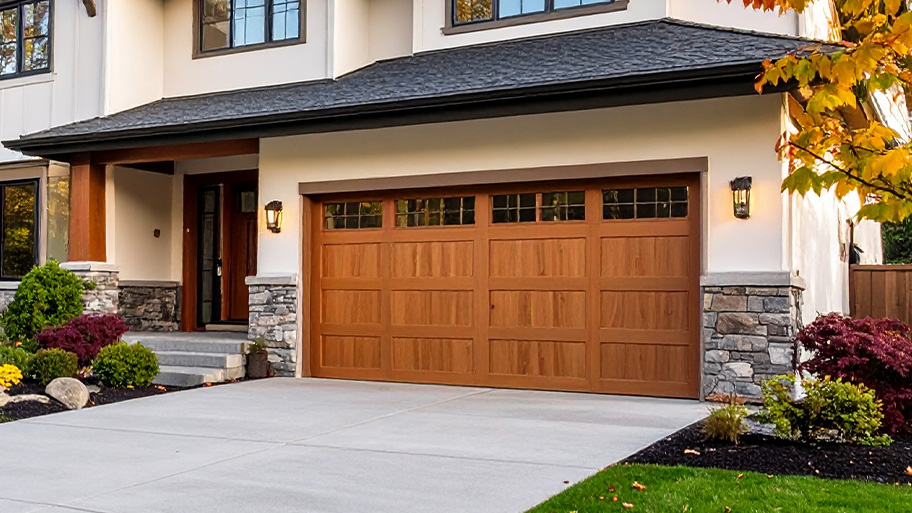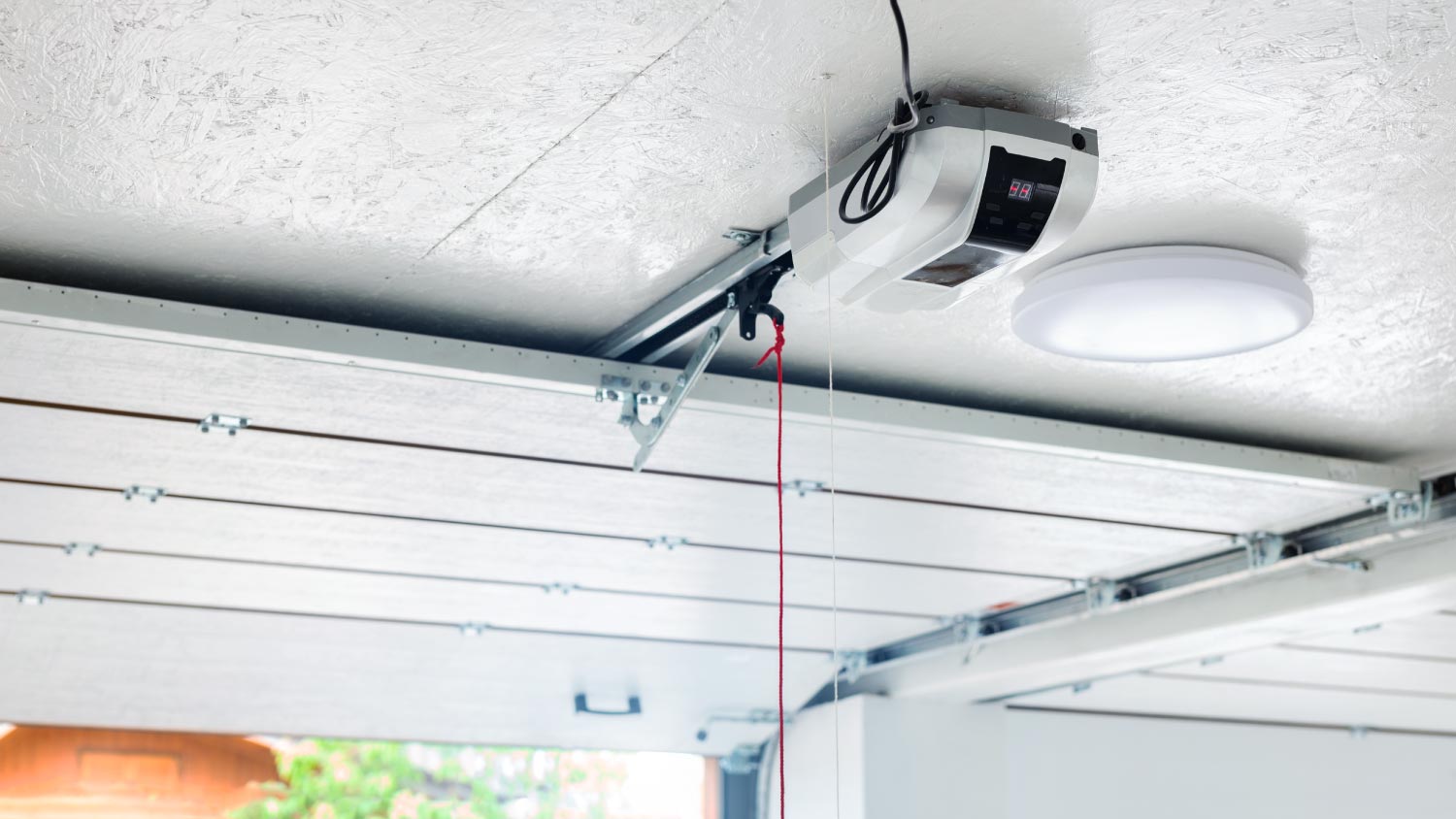
Replacing a garage door is necessary to add security and value to your home. Learn how each door type affects the total cost of this project in Charlotte, NC.
Open the door to a smart purchase


Selecting the right garage door opener is an important decision if you’re looking for convenience, security, and peace of mind. There are several factors to consider to ensure the product you choose is both safe and efficient. With our garage door opener buying guide, you can make an informed decision that works best for your household.
Before purchasing a garage door opener, you should determine the type of garage door you have. Each type of garage door operates differently, and the choice of opener should align with the specific mechanics of your door. Understanding your garage door type ensures compatibility and optimal performance, leading to a smoother and more efficient operation of the entire system.
There are three main types of garage doors: sectional, roll-up, and swing-out. Sectional doors are the most common and consist of several horizontal panels that slide upward along tracks. Roll-up doors, commonly found in commercial settings, roll vertically into a coil above the door opening. Swing-out doors, also known as carriage or barn-style doors, open outward like traditional double doors.
Measuring the height and weight of your garage door is essential for selecting an appropriate opener. Garage door openers are designed to handle various sizes and weights, and choosing one that aligns with your door's specifications is vital for smooth and efficient operation.
Ensure that the opener's lifting capacity matches or exceeds the weight of your garage door to prevent strain and potential damage. An underpowered opener may strain and wear out prematurely, while an overpowered one may result in excessive force, causing unnecessary wear and tear on the door's components.

Choosing the right garage door opener horsepower directly influences the efficiency and longevity of the system. The size and weight of your garage door largely determine the horsepower requirement. For example, larger and heavier doors necessitate higher horsepower to lift and lower them smoothly. Match the opener's horsepower with the specific requirements of your door to prevent strain on the motor and ensure optimal performance.
Below are the most common horsepower ratings for garage doors:
1/3 Horsepower: Despite being budget-friendly, 1/3 horsepower motors have a shorter life span than their 1/2 horsepower and 3/4 horsepower counterparts. They function adequately with lighter doors, but their overall durability may be limited. While technically capable of lifting doors with evenly distributed weights, pairing a 1/3 horsepower opener with a heavier door may lead to more frequent replacements compared to opting for a higher horsepower opener.
1/2 Horsepower: 1/2 horsepower openers are the most common and well-suited for single and double doors of moderate weight. Positioned as a mid-range option for both cost, they are versatile and suitable for a wide range of garage doors.
3/4 Horsepower: Particularly beneficial for heavy or wide garage doors, 3/4 horsepower openers ensure longevity and provide ample power. Despite being a pricier option, their extended life span and superior performance make them a worthwhile investment for those seeking a robust and reliable garage door opener.

Drive types directly impact a garage door opener's performance, noise level, and maintenance requirements. The three primary drive types are chain drive, belt drive, and screw drive.
Chain Drive: A metal chain moves the door along the track, making it durable and cost-effective, but tends to be noisier during operation.
Belt Drive: A rubber belt moves the door. This type is known for its quieter operation, making it suitable for attached garages or areas where noise is a concern.
Screw Drive: Featuring a threaded steel rod that lifts and lowers the door, screw drive openers offer a middle ground between chain and belt drives in terms of noise and maintenance requirements.
If your garage is attached to your living spaces or bedrooms, the noise produced during the opener operation can impact the overall comfort of your home. Assess your living situation to help you choose an opener that strikes the right balance between performance and noise, ensuring a peaceful and disturbance-free environment for your home. The drive type you choose will impact noise levels the most.
When selecting a garage door opener, prioritizing safety features is paramount in safeguarding individuals and property. Modern garage door openers have advanced safety measures to prevent mishaps and harm. One crucial element is the presence of sensors that can detect obstructions in the door's path. These sensors are placed near the bottom of the door and send a signal to the opener, automatically reversing the door if it senses a person or object. This serves to mitigate the likelihood of accidents or injuries.
Rolling code technology is another vital safety feature that should be considered. This system changes the access code each time the opener is activated, thwarting any attempts by unauthorized individuals to enter the garage by intercepting and replicating the transmitted code. Additionally, certain garage door openers are equipped with emergency release mechanisms so you can open your garage door manually if you lose power.
Choosing remote control options is crucial for garage door opener selection, impacting convenience and accessibility. While traditional handheld remotes offer a standard means of operation, modern technology introduces additional options, such as smartphone compatibility and Wi-Fi connectivity. Opting for an opener with these features enables remote control and monitoring via mobile apps, providing flexibility, especially when away from home.
Smart home integration allows voice control through virtual assistants like Amazon Alexa or Google Assistant. Ensuring the chosen opener aligns with your preferred remote control options enhances the overall user experience, providing the connectivity and convenience that suits your lifestyle.
Investing in a garage door opener equipped with a battery backup system is a wise choice to ensure uninterrupted functionality even during power outages. This essential feature provides a reliable secondary power source that enables your garage door to operate smoothly even when the main power supply is down. During emergencies, a battery backup system becomes particularly valuable as it guarantees your ability to access your vehicle or belongings through the garage door. This additional layer of convenience and security can be beneficial, especially during harsh weather conditions or unforeseen power failures.
If you plan to enhance your garage door system with accessories like keyless entry pads or additional remotes, ensure that the chosen opener is compatible with these add-ons. Checking compatibility in advance ensures seamless integration and a more customized user experience. You'll also want to ensure the opener works properly with the other parts of a garage door.
Reviewing warranty options when selecting a garage door opener assures the product's durability and the manufacturer's commitment to customer satisfaction. Most garage door opener warranties last between five and 15 years, so ensure you find one that features a long life span. Pay attention to the specific terms and conditions of the warranty, including any limitations or exclusions, to ensure you clearly understand the coverage provided. A comprehensive warranty protects your investment and provides peace of mind, knowing that you can rely on the manufacturer's support in the event of unexpected issues.
Consider reviews from reputable sources or verified purchasers to ensure the credibility of customer feedback. Real-world experiences shared by other users can provide insights into the performance, reliability, and overall satisfaction with a specific model or brand. Look for common themes in the reviews, paying attention to aspects such as ease of installation, noise levels, and durability. While individual opinions may vary, identifying recurring positive or negative comments can help you gauge the overall quality of the garage door opener.
Determining your budget for a garage door opener ensures you only search for options within your price range. While you'll want to review the garage door openers' costs, it's essential to factor in installation costs. Due to the weight of garage doors, it's not recommended to DIY any garage component installation.
Homeowners should hire a professional garage door installer to tackle the opener. A garage door opener installation costs between $220 and $540 and provides peace of mind that everything is installed safely.
Nick P. Cellucci contributed to this piece.
From average costs to expert advice, get all the answers you need to get your job done.

Replacing a garage door is necessary to add security and value to your home. Learn how each door type affects the total cost of this project in Charlotte, NC.

Garage door tune-ups aren’t too expensive, and most of the fixes are simple. That being said, simple doesn’t always mean safe, so it’s best to hire a pro for this project.

Replacing a garage door sensor is one of the least expensive fixes for a garage door. Learn how you may not need to totally replace it if it only requires an alignment or cleaning.

Solve why your garage door isn't opening with your remote control using these common causes and fixes.

If you keep hearing unusual sounds when you open and close your garage, you might wonder: Why is my garage door beeping? Here are three possible reasons.

Garage door opener horsepower depends on the type and size of your door. Here’s what you need to know about choosing the power behind your garage door opener.